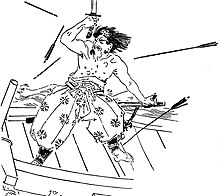Shimokōbe Yukihira (下河辺行平, dates unknown) was a Japanese samurai of the late Heian and early Kamakura periods. He was one of the closest retainers of Minamoto no Yoritomo, the first Kamakura shōgun, and was a personal tutor to the second, Minamoto no Yoriie.
Shimokōbe Yukihira | |
|---|---|
 Shimokōbe Yukihira | |
| Born | unknown, probably twelfth century |
| Died | unknown, but no earlier than 1195 |
| Allegiance | Minamoto clan, later Kamakura shogunate |
| Battles / wars | Genpei War (Shida Yoshihiro Incident) and Ōshū War |
| Relations | Fujiwara no Hidesato (remote ancestor), Shimokōbe Yukiyoshi (father), Shimokōbe Masayoshi (brother) |
Life
editThe birth date of Shimokōbe Yukihira, a samurai[1] of the late Heian[2] and early Kamakura periods,[1] is unknown.[1] He was the administrator (ja) Shimokōbe Manor in Katsushika District, Shimōsa Province[1] (modern Ibaraki Prefecture,[3] specifically the area corresponding to Koga City and its environs[4]) and was the son of Shimokōbe Yukiyoshi[4] and the elder brother of Shimokōbe Masayoshi.[3] His clan were descendants of Fujiwara no Hidesato.[5]
He was initially a vassal of the Taira clan,[6] but when Prince Mochihito and Minamoto no Yorimasa had their call to arms, it was Yukihira who brought the word to his lord Minamoto no Yoritomo,[4] and he joined Yoritomo when he called his banners.[2] It was during Yoritomo's retreat to Awa Province following the Battle of Ishibashiyama that Yukihira added his forces to Yoritomo's.[6] He was a trusted retainer of Yoritomo, and in Yōwa 1 (1181) was selected as one of his personal bodyguards (寝所近辺祗候衆).[5] He was a prominent gokenin.[5]
He fought valiantly in the Jishō-Juei War,[1] including the defeat of Shida Yoshihiro (ja),[6] and the invasion of Ōshū.[7] He reputedly had tremendous martial skill,[3] particularly with the bow,[4] demonstrating his skill frequently in yabusame, yumi-hajime (弓始) and deer-hunting.[4] He later taught archery to Minamoto no Yoriie.[1]
In Kenkyū 6 (1195) he was accepted as a member of Yoritomo's household (ja),[1] but his activities in the Hatakeyama Shigetada incident (ja) and later are uncertain.[5] The date of his death is unknown.[2]
References
editCitations
edit- ^ a b c d e f g Sawano 1994; Hosokawa 1998; Nihon Jinmei Daijiten Plus 2015.
- ^ a b c Sawano 1994; Nihon Jinmei Daijiten Plus 2015.
- ^ a b c Nihon Jinmei Daijiten Plus 2015.
- ^ a b c d e Sawano 1994.
- ^ a b c d Sawano 1994; Hosokawa 1998.
- ^ a b c Hosokawa 1998.
- ^ Sawano 1994; Hosokawa 1998; Nihon Jinmei Daijiten Plus 2015; Suzuki 1983, p. 246.
Works cited
edit- Hosokawa, Ryōichi (1998). "Shimokōbe Yukihira" 下河辺行平. World Encyclopedia (in Japanese). Heibonsha. Retrieved 2018-07-29.
- "Shimokōbe Yukihira" 下河辺行平. Nihon Jinmei Daijiten Plus (in Japanese). Kodansha. 2015. Retrieved 2018-07-29.
- Sawano, Izumi (1994). "Shimokōbe Yukihira" 下河辺行平. Asahi Nihon Rekishi Jinbutsu Jiten (in Japanese). Asahi Shinbun-sha. Retrieved 2018-07-29.
- Suzuki, Keizō (1983). "Buke kojitsu". Nihon Koten Bungaku Daijiten 日本古典文学大辞典 (in Japanese). Vol. 5. Tokyo: Iwanami Shoten. pp. 246–248. OCLC 11917421.